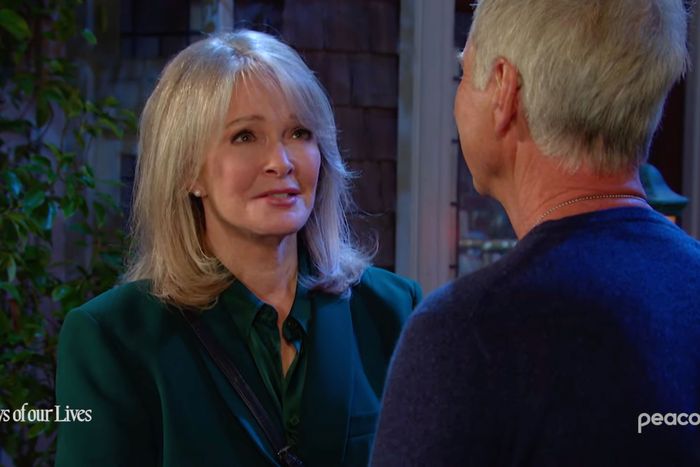
More than one week into the strike by the Writers Guild of America, we still have so many questions begging to be answered: How long will the strike go on? What does this mean for my favorite show? Why are the studios and streamers being so withholding while their top executives have such inflated salaries? But there is one more question we have yet to ask: Won’t somebody think of the soaps?! Writers are striking over truncated seasons and smaller rooms, but soap operas — vestiges of an older, more rabbit-eared era of broadcasting — are massive, sprawling operations with tens of thousands of episodes of canon and plot to keep track of. Soap-opera writers have to produce around 250 episodes a year, with five original episodes airing most weeks. Their production schedules are tighter and more demanding than other serialized dramas, meaning soap-opera audiences theoretically feel the effects of a strike sooner than fans of most other series. During the 2007–8 WGA strike, eight soap operas were on the air. In 2023, only four are still in production. We spoke to soap-opera veterans on a picket line in Manhattan to hear how the strike is affecting them.
The head writer on Days of Our Lives, Ron Carlivati, might just be one of the most powerful creative voices in soap operas of the 21st century, having also run the writers rooms at One Life to Live and General Hospital. Carlivati has been a member of the WGA since “around 1997,” so this isn’t his first experience on the picket line. “Our unique circumstance is our show’s on every day of the year,” he said. “So unlike a lot of these shows that aren’t in production, our show is in production right now. And the shows don’t stop. They replaced us in 2007 when I worked at One Life to Live, and I can only assume they’re replacing us right now. I’m being replaced on day one by other people.”
Carlivati was referring to the “Financial Core” legal loophole that allows writers to revoke their union status while still benefiting from collective-bargaining agreements. This allows them to keep working during a strike instead of standing in solidarity with their colleagues. During the previous writers’ strike, only 28 writers out of thousands filed for Fi-Core status and broke the picket line. The majority of those worked on soaps, including All My Children, One Life to Live, General Hospital, and The Young and the Restless. When the strike ended after 100 days, the WGA East and West guilds published the writers’ names in the trade papers. Days of Our Lives now films further in advance than it used to, so it may take longer for viewers to notice a change in the quality of writing and dialogue. “They have scripts of mine and my team right now; I’ve written the show through almost Christmas,” he said. “A lot of it is taped already, and what I’ve written already is taping in a few weeks, so soon they will run out. But as they did in 2007, the shows have continued.”
Anna Theresa Cascio is another veteran of soaps who retired a year and a half ago after more than 30 years working in the genre, some under Carlivati. Standing near the picket line registration on the day we spoke, she called him “the greatest boss in the world” and reflected on the Fi-Core writers replacing their team during the previous strike. “I watched his heart break in the first strike,” she said. “He had just gotten the job. He had a gazillion ideas. That’s what I love about him: He actually has a love of this genre, and it’s hard because he watched them go and change the stories. The scabs were doing the work, and it was literally a shit show.”
Cascio’s husband, an actor named Doc Dougherty who has appeared in soap operas and considers that industry particularly tight-knit and familial, was picketing as a member of the Screen Actors Guild and weighed in. “Anybody who hears this, if you ever are a scab, you’re dead to me, and don’t come within 100 feet of me or my family.”
Although Fi-Core writers were the only ones officially credited with writing these strike-era episodes of the network soaps, producers, assistants, and even execs were reported at the time to have assisted in scripting. “I think there were like 50 episodes of our show written during that time,” said Carlivati. “And of course, they don’t give them to you until the strike is over. And then they hand you this pile. And I had to read it to find out what was going on on my own show.” He added that the issues on the table this time are more pressing than ever. In 2022, NBCUniversal migrated Days of Our Lives from NBC, where it had aired for over 50 years, to Peacock, where it now streams new episodes exclusively.
Cascio started working on soaps because of the job security and protections for staff writers. Prior to that, she worked in features development. “It was very difficult because you had to keep pitching for no money and then do rewrites over and over again for no money. I finally said, You know what? I’m gonna go on a soap so I have a weekly paycheck.” Cascio, a graduate of the Yale School of Drama, said that working in soap operas allowed her to have a stable, New York–based writing career, one that allowed her to pursue playwriting simultaneously. “My friends who write for streaming can’t plan a family, can’t plan to buy a house. And you think, Oh my god, they’re so successful! They’re on these great shows! This is so cool!” She shook her head: “No, no.” She saw firsthand the viable career paths that writers’ rooms prior to streaming presented to young writers at the beginning of their careers. “I met Ron Carlivati on my first day on One Life to Live. He was our assistant, and I said, ‘He’s gonna be my boss someday.’ And he was!”
What do we lose when we pull these committed, decades-long soap writers away from their projects and replace them with scabs? We miss brilliance. We miss mania. Cascio recounted an example from when Carlivati was heading One Life to Live in 2013. “We were sitting in his apartment doing a Fourth of July episode. Our fans love holidays. And we had the ‘evil woman’ come in, and she was trying to get the good guy. And we came up with this idea that there’s a little girl with a baby doll, and the evil woman is pregnant with the good guy’s baby, so she goes, ‘I guess I should practice.’ And she holds the doll and goes, ‘Ew! It wet on me!’ And she throws the doll on the grill and it explodes. That was one of my favorites.”


